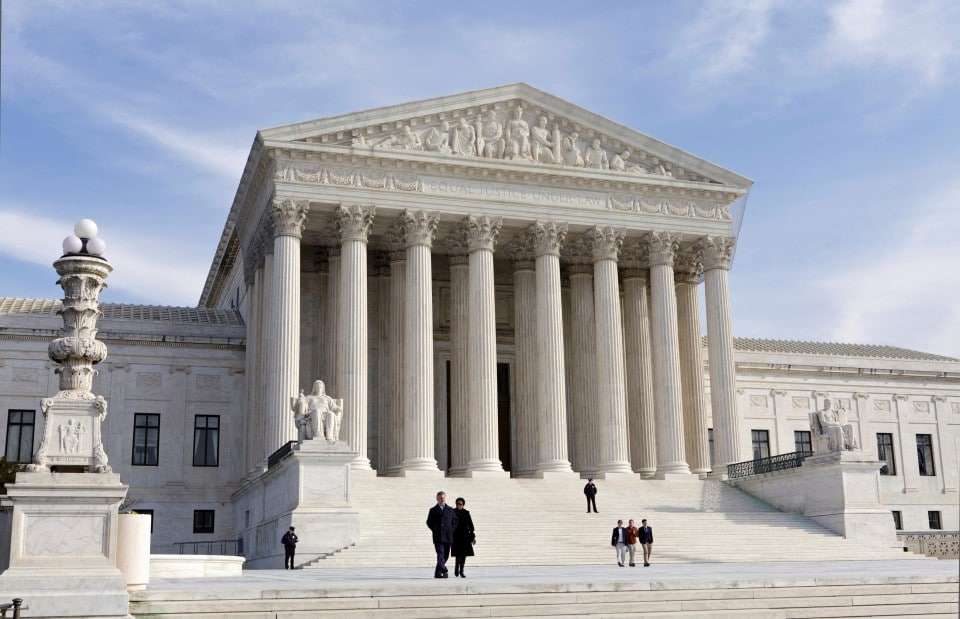The Volokh Conspiracy
Mostly law professors | Sometimes contrarian | Often libertarian | Always independent
Supreme Court rejects enforcement of Trump travel ban against grandparents and other close relatives of US residents, sends refugee issue back to lower court [updated with a clarification]

The Supreme Court today rejected the Trump administration's motion to overturn a trial court ruling against its position that grandparents and other close relatives of residents of the United States do not have a "close familial relationship" of the kind necessary to exempt them from President Trump's travel ban executive order, under the Court's June ruling defining the appropriate scope of lower court injunctions restricting the order. The Court's order (which does not include any reasoning justifying the ruling) is here.
The Court chose not to rule on the issue of whether the administration should be allowed to apply the travel ban to refugees who have an established relationship with American resettlement issues. Instead, it left that issue for consideration by the US Court of Appeals for the Ninth Circuit. In the meantime Judge Watson's ruling on that question is stayed.
Last week, federal district court judge Derrick Watson ruled against the administration on both of these issues, after the state of Hawaii (one of the plaintiffs in the case against the travel ban) brought a motion challenging the government's application of the travel ban to these two groups. The Trump administration decided to take these questions to the Supreme Court, in addition to the more usual path of appealing to the Ninth Circuit.
For reasons I summarized in this post, I think Judge Watson got both issues right. The flaws in the administration's position on grandparents and other similar relatives are blatantly obvious. If a mother-in-law qualifies as a sufficiently close relative, as the Supreme Court indicated in its June ruling, the same goes for grandparents, aunts, uncles, and others. The administration's position on the refugee question is only slightly more defensible. Refugees who have obtained formal assurances of resettlement assistance from US aid organizations closely fit the Supreme Court's requirement of a "bona fide relationship" with an entity in the US.
It is possible that the justices left the refugee issue entirely to the Ninth Circuit because they are genuinely uncertain about how it should be addressed. But it is also possible that they did so because, as a general rule, they prefer for this sort of issue to be dealt with by lower courts before weighing in. The resolution of the issue involving relatives is so blatantly obvious that the justices might have concluded there is little point in further consideration of it. The refugee issue is less lopsided, though I think the administration's position on it is still very weak.
I would be surprised if the Ninth Circuit, which has supported the plaintiffs on most issues related to the travel ban litigation, ultimately ruled in the administration's favor on this question. Overall, today's ruling is a win for Hawaii. It rules against the administration on one of the two disputed issues, and - at least for the moment - leaves the other in the hands of a court likely to rule in Hawaii's favor.
The three conservative justices who dissented from the Supreme Court's earlier ruling on the injunctions also dissented today, and would have stayed Judge Watson's ruling in its entirety. Like the majority, the three dissenters did not offer any reasoning explaining their position. But, presumably, they took the position they did that is because they believe there should not be any injunctions at all against any part of the order, as stated in their dissent from the Court's previous ruling.
In May and June, two federal appellate courts issued preliminary injunctions blocking implementation of Trump's travel ban order: the Fourth Circuit because it was likely motivated by unconstitutional discrimination against Muslims; the Ninth Circuit because it determined that the president had exceeded the statutory authority granted to him by Congress. On June 26, the Supreme Court partly lifted the injunctions, but retained them with respect to "foreign nationals who have a credible claim of a bona fide relationship with a person or entity in the United States,", including those who have a "close familial relationship" with a US resident.
Today's ruling, like the June 26 decision, deals only with the scope of the preliminary injunctions against the travel ban. The case will be argued on the merits in October, though it is possible that by that time the issues involved will be moot.
UPDATE: It's worth noting that the Supreme Court did not definitively rule on the merits of the issue involving the relatives either, as formally it merely denied the administration's motion for "clarification" of the June 26 ruling on this subject, thereby leaving Judge Watson's ruling in force. It is theoretically possible that the Ninth Circuit could rule against Hawaii on this question or that the Supreme Court could ultimately reverse a Ninth Circuit ruling in its favor. However, today's decision signals that such an outcome is unlikely. Prominent Supreme Court reporter Lyle Denniston suggests that today's ruling on the relatives issue is more definitive. I will try to get some clarification of this question.


Show Comments (0)